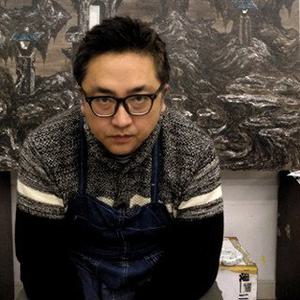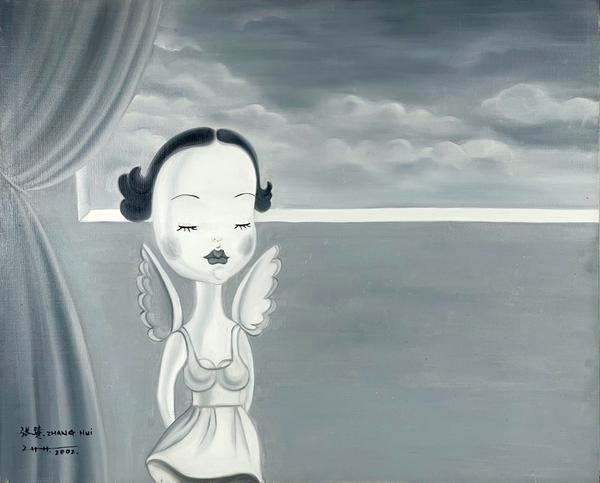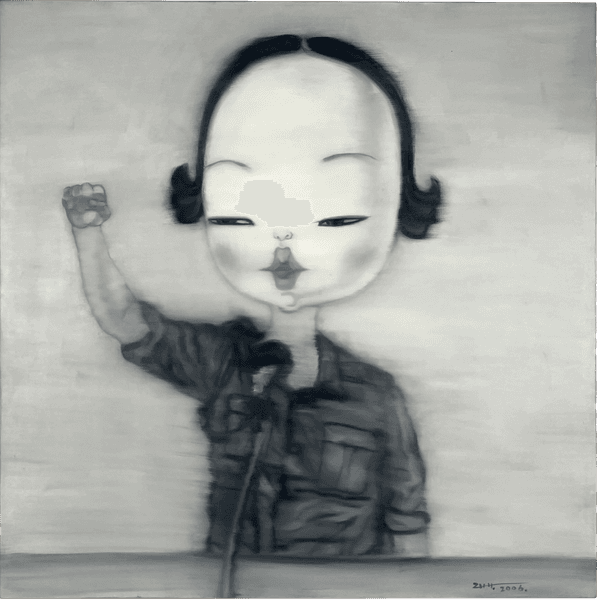Zhang Hui
Zhang Hui (b.1968), born into a family of performers in Beijing in 1968, inherited a rich artistic legacy from his parents deeply immersed in folk music and dance. Studying at the New Mural Painting Department of the Central Academy of Fine Arts from 1987 to 1991, he explored materials and conceptual art. In 1995, Zhang Hui made his mark with a collection of oil paintings capturing the twilight ambiance of Beijing, titled "Entry," which garnered widespread acclaim.
Venturing to the United States in 2000 to reunite with his family, Zhang Hui pursued a master's degree at the Minneapolis College of Art and Design. There, he experimented with new media art, pushing the boundaries of his creativity. However, by 2003, Zhang Hui returned to his roots in painting with a renewed vision, focusing on the visual allure of the two-dimensional plane through concise colour arrangements and dynamic brushwork.
Returning to Beijing in 2011, Zhang Hui found inspiration in the familiar landscapes and faces surrounding him. His paintings evolved to embody a fusion of memory and present, employing emotional symbols and imagery such as seasonal flora, stacked stones, drifting clouds, and enigmatic figures that blur the line between humanity and divinity.
Zhang Hui's work transcends conventional realism, eschewing the confines of medium language exploration in favour of consciously moulding his own creative expression. Seamlessly integrating motifs dismissed by critics like Greenberg, he revives them with palpable vitality and boundless imagination. With serene mastery, Zhang Hui navigates the remnants of Western classical and traditional Chinese aesthetics, infusing them with a contemporary perception of life.
Free from cultural constraints, Zhang Hui invites viewers to traverse beyond preconceived notions, offering spiritual solace through meticulous observation and profound introspection. Through his paintings, he provides a gateway to a world where established prejudices and estrangements dissolve, allowing for a deeper understanding and appreciation of the human experience.
Featured Artists
- Albers Anni
- Ancart Harold
- Andre Carl
- Avery Milton
- Baldessari John
- Barnes Ernie
- Castellani Enrico
- Crawford Brett
- Dadamaino
- de Tollenaere Saskia
- Dyson Julian
- Elsner Slawomir
- Freud Lucian
- Gadsby Eric
- Gander Ryan
- Guston Philip
- Hayes David
- Held Al
- Hill Anthony
- Hockney David
- Hutchinson Norman Douglas
- Jenney Neil
- Katz Alex
- Kentridge William
- Knifer Julije
- Kusama Yayoi
- Le Parc Julio
- Leciejewski Edgar
- Léger Fernand
- Levine Chris
- Marchéllo
- Mavignier Almir da Silva
- Miller Harland
- Modé João
- Morellet François
- Nadelman Elie
- Nara Yoshitomo
- Nesbitt Lowell Blair
- O'Donoghue Hughie
- Perry Grayson
- Picasso Pablo
- Pickstone Sarah
- Prehistoric Objects
- Riley Bridget
- Ruscha Ed
- Sedgley Peter
- Serra Richard
- Shrigley David
- Smith Anj
- Smith Richard
- Soto Jesús Rafael
- Soulages Pierre
- Spencer Stanley
- Taller Popular de Serigrafía
- The Connor Brothers
- Vasarely Victor
- Wood Jonas


